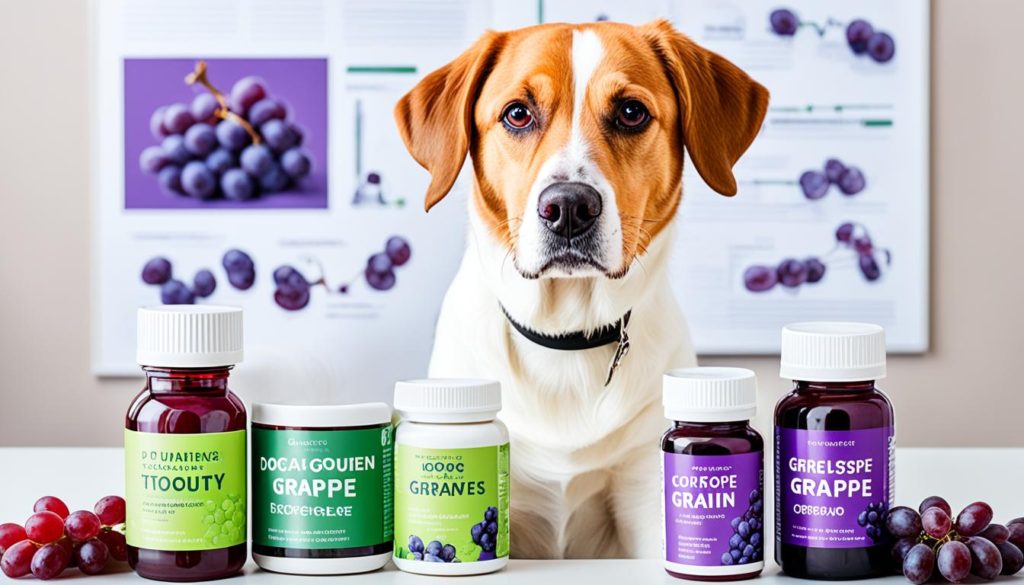Grapes and raisins can be highly toxic to dogs, potentially leading to fatal kidney failure. The exact reason for the toxicity is still unknown, and individual sensitivity to the toxin can vary.
There is no definitive answer to how many grapes or raisins can be deadly for a dog, as it depends on factors such as the dog’s weight and sensitivity.
However, there have been cases of dogs experiencing poisoning after ingesting as few as 4-5 grapes. It is important for pet owners to be cautious and keep grapes and raisins out of reach of their dogs.
Key Takeaways
- Grapes and raisins can be highly toxic to dogs and can potentially lead to fatal kidney failure.
- The exact amount of grapes or raisins that can be toxic to a dog varies due to factors such as the dog’s weight and sensitivity.
- It is best to keep grapes and raisins out of reach of dogs to prevent them from ingesting these potentially toxic fruits.
- If a dog ingests grapes or raisins, immediate veterinary care is necessary to minimize the risk of kidney damage.
- Use a dog grape toxicity calculator to estimate the potential toxicity based on your dog’s weight, but remember that individual sensitivity can vary.
Grapes and Raisins Toxicity in Dogs
Grapes and raisins can be highly toxic to dogs, posing serious health risks. The toxic substance present in these fruits can cause severe illness, especially in dogs. It is crucial for dog owners to be aware of the dangers associated with grape consumption and take necessary precautions to protect their furry companions.
Symptoms of Grape Toxicity in Dogs
If a dog ingests grapes or raisins, it can exhibit various symptoms indicating grape toxicity. These symptoms may include:
- Vomiting
- Diarrhea
- Weakness
- Lethargy
- Increased thirst
- Abdominal pain
- Decreased urine production
The severity of these symptoms can vary depending on the individual dog’s sensitivity to the toxic substance found in grapes. Therefore, it is essential to pay close attention to any signs of grape toxicity and seek immediate veterinary care if necessary.
Calculating Grape Toxicity in Dogs
When it comes to grape toxicity in dogs, calculating the exact amount of grapes or raisins that can be toxic is challenging. However, there are general guidelines based on reported cases of grape toxicity. It’s important to note that individual sensitivity to the toxin can vary.
The lowest reported toxic dose for raisins is approximately 0.04oz per pound (2.8g per kg) of body weight, while for grapes, it is around 0.32oz per pound (19.6g per kg) of body weight.
Let’s take a closer look at how this translates into potential toxicity levels for dogs of varying weights:
| Dog Weight | Grapes | Raisins |
|---|---|---|
| 10 lbs (4.5 kg) | 17 grapes | 11 raisins |
| 40 lbs (18 kg) | 68 grapes | 44 raisins |
Keep in mind that these are estimates based on reported cases, and grape toxicity can vary between dogs. It’s essential to err on the side of caution and keep grapes and raisins out of your dog’s reach.
Why Are Grapes and Raisins Toxic to Dogs?
The exact reason why grapes and raisins are toxic to dogs is still not fully understood. Recent research suggests that tartaric acid and potassium bitartrate, present in grapes and raisins, may be responsible for kidney damage seen in cases of poisoning. The levels of these substances can vary in different types of grapes and growing conditions, which may explain why some dogs are more sensitive to the toxicity than others. Further research is needed to fully understand the mechanisms of toxicity and to develop more accurate diagnostic and treatment options.

Treating Grape Toxicity in Dogs
If your dog has ingested grapes or raisins, it is crucial to seek immediate veterinary treatment. The toxic substances in grapes can lead to severe kidney damage and even fatal kidney failure in dogs. Prompt and appropriate treatment can significantly improve the chances of a positive outcome.
When a dog ingests grapes or raisins, one of the first steps in treatment may involve inducing vomiting to remove any remaining grapes from the stomach. This is typically done within a couple of hours after ingestion, so it’s important to act quickly.
To further eliminate the toxins from the dog’s system, the veterinarian may administer activated charcoal, which binds to the toxic substances and prevents their absorption into the bloodstream. Laxatives may also be given to help facilitate the elimination of the toxin.
Another crucial aspect of treatment is intravenous fluid therapy. This involves administering fluids directly into the dog’s bloodstream to maintain hydration and support optimal kidney function. The kidneys play a crucial role in filtering waste products from the blood, and intravenous fluids can help support their function and flush out any accumulated toxins.
Throughout the treatment process, the dog’s condition and kidney function will be closely monitored through regular blood and urine tests. These tests allow the veterinarian to assess the extent of kidney damage and adjust the treatment plan accordingly.

The prognosis for dogs with grape toxicity depends on several factors, including the severity of kidney damage, the amount of grapes ingested, and the timeliness of treatment. Some dogs may recover fully with prompt and appropriate treatment, while others may experience long-term kidney complications.
Conclusion
Grapes and raisins pose a significant threat to the health and well-being of dogs, as they can cause severe kidney damage and even be fatal. While there is no exact answer to how many grapes or raisins can be toxic to dogs, it is crucial to prioritize their safety by keeping these fruits out of their reach. If your dog accidentally ingests grapes or raisins, it is vital to seek immediate veterinary care to minimize the risk of kidney damage.
To better understand the potential toxicity, pet owners can utilize a grape toxicity calculator, which takes into account the weight of the dog. However, it is essential to bear in mind that dogs’ sensitivity to grape toxicity can vary significantly, and even a small amount can have detrimental effects. Therefore, it is best not to rely solely on the calculator and instead prioritize prevention by ensuring grapes and raisins are kept away from dogs.
Ultimately, the exact reasons behind grape and raisin toxicity in dogs are still not fully understood. Research suggests that certain compounds, like tartaric acid and potassium bitartrate, may be responsible for the kidney damage observed in cases of poisoning. Nevertheless, further investigations are needed to develop more accurate diagnostic methods and treatment options.
FAQ
How many grapes can be toxic to a dog?
The exact amount of grapes that can be toxic to a dog is uncertain as it varies depending on factors such as the dog’s weight and sensitivity. However, even small amounts of grapes or raisins can be toxic to dogs, with some dogs experiencing poisoning after ingesting as few as 4-5 grapes.
What are the symptoms of grape toxicity in dogs?
Symptoms of grape toxicity in dogs can include vomiting, diarrhea, weakness, lethargy, increased thirst, abdominal pain, and decreased urine production. The severity of the symptoms can vary depending on the individual dog’s sensitivity to the toxin.
How do I calculate grape toxicity in my dog?
While it is difficult to calculate the exact toxicity of grapes for a dog, there are general guidelines based on reported cases. The lowest reported toxic dose for raisins is 0.04oz per pound (2.8g per kg) of body weight, and for grapes, it is 0.32oz per pound (19.6g per kg) of body weight. Using these toxic doses, you can estimate the potential toxicity based on your dog’s weight.
Why are grapes and raisins toxic to dogs?
The exact reason why grapes and raisins are toxic to dogs is still unknown. Recent research suggests that tartaric acid and potassium bitartrate, present in grapes and raisins, may be responsible for kidney damage seen in cases of poisoning. However, further research is needed to fully understand the mechanisms of toxicity.
How is grape toxicity in dogs treated?
If your dog has ingested grapes or raisins, it is crucial to seek immediate veterinary treatment. Treatment may include inducing vomiting, administering activated charcoal and laxatives to eliminate the toxin, intravenous fluid therapy for hydration and kidney function support, and close monitoring through blood and urine tests.
What is the prognosis for dogs with grape toxicity?
The prognosis for dogs with grape toxicity depends on the severity of kidney damage and the timeliness of treatment. Seeking immediate veterinary care increases the chances of a favorable outcome.

